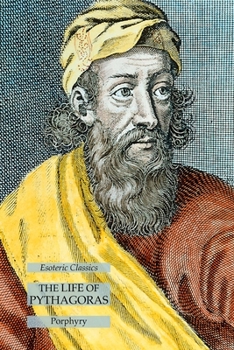The Life of Pythagoras: Esoteric Classics
Select Format
Select Condition 
Book Overview
Authentic memoirs of the life of Pythagoras--the father of philosophy and the inventor of geometry--hold the great interest for every lover of wisdom. Iamblichus' biography is universally acknowledged... This description may be from another edition of this product.
Format:Paperback
Language:English
ISBN:1631185128
ISBN13:9781631185120
Release Date:May 2021
Publisher:Lamp of Trismegistus
Length:38 Pages
Weight:0.15 lbs.
Dimensions:0.1" x 6.0" x 9.0"
Customer Reviews
2 ratings
Good book
Published by Thriftbooks.com User , 17 years ago
For being written a couple thousand years ago, this book is pretty good. Although wordy it gives a great narrative of Pythagoras after he returned home from his Egyptian and Summarian travels.
An Excellent Medium for the Introduction to the Life and Teachings of Pythagoras
Published by Thriftbooks.com User , 17 years ago
Approximately eight-hundred years had lapsed since the passing of Pythagoras when Iamblichus penned his biography on the venerable philosopher sometime in the early 4th century AD. Yet Iamblichus was, by all means, wholly qualified for the task of compiling a fluid account of Pythagoras' life and work [collected from various histories and testamonia, ancient and closer to his time], since Iamblichus himself was an adept and ingenious philosopher, a mystic and pontiff who was the archetypal Platonist and Pythagorean. And moreover, he was enthusiastic, indeed one might say evangelic, in the transmission and dissemination of the teachings stemming from the Platonic/Pythagorean tradition. The Life of Pythagoras, then, was a cornerstone to the larger structure which he erected as an encyclopedia concerning Pythagoreanism. Other works included in Iamblichus' Pythagoric compendium are engaged with mathematical and numerical theory, commentary on the Pythagorean symbols and an exhortation to live the philosophic life, which also contains a commentary on many famed aphorisms belonging to the Pythagorean tradition [see, Thomas M. Johnson, Exhortation to Phil.]. The Life of Pythagoras is rich in detail and covers Pythagoras' life, work and legacy, while simaltaneously conveying tales pertaining to events sacred, miraculous [resembling early Christian hagiography] and mundane. Also included in the Life are scrupulous descriptions of Pythagorean doctrine and ritual practice and as an epilogue, Iamblichus furnishes us with a list of those philosophers who followed the Pythagorean succession. All in all, Iamblichus' biographical tribute to Pythagoras will serve as an excellent medium for the introduction to the life and teachings of Pythagoras.






